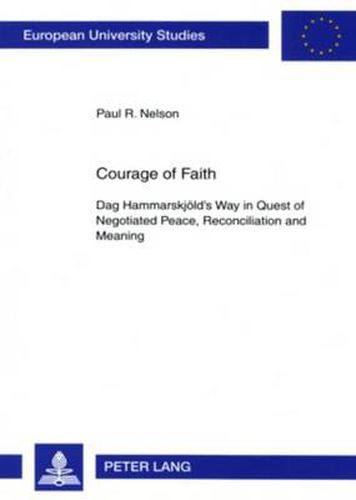Readings Newsletter
Become a Readings Member to make your shopping experience even easier.
Sign in or sign up for free!
You’re not far away from qualifying for FREE standard shipping within Australia
You’ve qualified for FREE standard shipping within Australia
The cart is loading…






The only true ‘profile’ that can be drawn. The aim of this book is to analyse and interpret the inside significance of Dag Hammarskjoeld’s profile and way in quest of negotiated peace, reconciliation and meaning. Dag Hammarskjoeld, UN Secretary-General from 1953 to 1961, disclosed in Vagmarken (Markings) his inner negotiations with himself and with God. Rival interpretations of his dialectic of action, doubt and search for meaning require arbitration through the hermeneutics of Paul Ricoeur. Three purposes in the light of archive documentation of Dag Hammarskjoeld’s Papers are investigated: First the existential-ontological dimension: courage of faith for an ecumenical view of life for negotiated peace, truth and reconciliation during a secularized era for ethical and spiritual values. The second aspect is Hammarskjoeld’s negotiated God-talk. Five elements including meditations on the mystery of Christ. Finally, the author shows that the normative-ethical problem concerns his straight path praxis for human rights and a diplomacy of reconciliation.
$9.00 standard shipping within Australia
FREE standard shipping within Australia for orders over $100.00
Express & International shipping calculated at checkout
The only true ‘profile’ that can be drawn. The aim of this book is to analyse and interpret the inside significance of Dag Hammarskjoeld’s profile and way in quest of negotiated peace, reconciliation and meaning. Dag Hammarskjoeld, UN Secretary-General from 1953 to 1961, disclosed in Vagmarken (Markings) his inner negotiations with himself and with God. Rival interpretations of his dialectic of action, doubt and search for meaning require arbitration through the hermeneutics of Paul Ricoeur. Three purposes in the light of archive documentation of Dag Hammarskjoeld’s Papers are investigated: First the existential-ontological dimension: courage of faith for an ecumenical view of life for negotiated peace, truth and reconciliation during a secularized era for ethical and spiritual values. The second aspect is Hammarskjoeld’s negotiated God-talk. Five elements including meditations on the mystery of Christ. Finally, the author shows that the normative-ethical problem concerns his straight path praxis for human rights and a diplomacy of reconciliation.